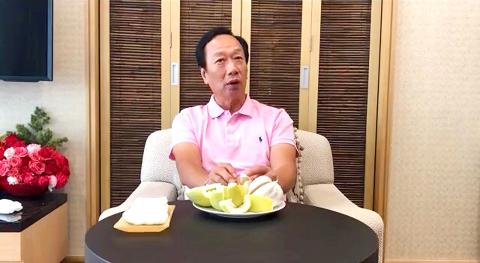The Chinese Nationalist Party (KMT) yesterday said that Hon Hai Precision Industries Co founder Terry Gou (郭台銘) reneged on a promise to support it, a day after the tycoon quit the party.
Gou’s departure came after months of speculation that he might run as an independent in next year’s presidential election after losing the KMT’s presidential primary to Kaohsiung Mayor Han Kuo-yu (韓國瑜) in July.
The KMT posted on Facebook a video montage of Gou pledging that he would support the winner of the primary.

Photo courtesy of Gou’s campaign
Gou is shown as having made statements to that effect on April 17, when he received honorary membership of the party, and on May 13, after he emerged from a conference with KMT Chairman Wu Den-yih (吳敦義).
Former Hon Hai “chairman Gou, you said you would do everything in your power to support the candidate elected by the party’s nomination process. Now what?” the post asked.
“The administrator of this account believed that as an honorary party member, you would understand the hard work the chairman [Wu] and the party center put into the primary, but you quit,” it said.
The KMT Culture and Communications Committee said in a statement that Gou has not lived up to the solemn promises he made when he accepted KMT membership in front of portraits of the party’s past leaders, including Sun Yat-sen (孫逸仙), Chiang Kai-shek (蔣介石) and Chiang Ching-kuo (蔣經國).
Gou yesterday posted a video greeting for the Mid-Autumn Festival on Facebook, saying: “Leaving the party lifted a great weight off my shoulders.”
The Central Election Commission yesterday began registration of presidential candidates, with Ou Chung-ching (歐崇敬), a Formosa Alliance member running without the party’s blessing; Non-Partisan Solidarity Union member Chen Yuan-chi (陳源奇); and Master Wu-shan (釋悟善), a Buddhist monk, picking up forms.
Wu-shan said that he gave more than NT$100 million (US$3.22 million) to charitable causes and his platform is to recreate Taiwan’s “economic miracle” by “buying emptiness, moving emptiness and turning all to emptiness.”
Chen, a former representative of the now-defunct National Assembly, ran in the Taipei City Council’s Second District by-election in January and received 89 votes. He is perhaps best known for the 1995 legislative election in Matsu, where he received five votes.
Ou is on the Formosa Alliance’s decisionmaking committee and last week announced his presidential ambitions on YouTube.
Tuesday next week is the final day that the commission accepts applications from independent candidates.

Alain Robert, known as the "French Spider-Man," praised Alex Honnold as exceptionally well-prepared after the US climber completed a free solo ascent of Taipei 101 yesterday. Robert said Honnold's ascent of the 508m-tall skyscraper in just more than one-and-a-half hours without using safety ropes or equipment was a remarkable achievement. "This is my life," he said in an interview conducted in French, adding that he liked the feeling of being "on the edge of danger." The 63-year-old Frenchman climbed Taipei 101 using ropes in December 2004, taking about four hours to reach the top. On a one-to-10 scale of difficulty, Robert said Taipei 101

Nipah virus infection is to be officially listed as a category 5 notifiable infectious disease in Taiwan in March, while clinical treatment guidelines are being formulated, the Centers for Disease Control (CDC) said yesterday. With Nipah infections being reported in other countries and considering its relatively high fatality rate, the centers on Jan. 16 announced that it would be listed as a notifiable infectious disease to bolster the nation’s systematic early warning system and increase public awareness, the CDC said. Bangladesh reported four fatal cases last year in separate districts, with three linked to raw date palm sap consumption, CDC Epidemic Intelligence

Taiwanese and US defense groups are collaborating to introduce deployable, semi-autonomous manufacturing systems for drones and components in a boost to the nation’s supply chain resilience. Taiwan’s G-Tech Optroelectronics Corp subsidiary GTOC and the US’ Aerkomm Inc on Friday announced an agreement with fellow US-based Firestorm Lab to adopt the latter’s xCell, a technology featuring 3D printers fitted in 6.1m container units. The systems enable aerial platforms and parts to be produced in high volumes from dispersed nodes capable of rapid redeployment, to minimize the risk of enemy strikes and to meet field requirements, they said. Firestorm chief technology officer Ian Muceus said

MORE FALL: An investigation into one of Xi’s key cronies, part of a broader ‘anti-corruption’ drive, indicates that he might have a deep distrust in the military, an expert said China’s latest military purge underscores systemic risks in its shift from collective leadership to sole rule under Chinese President Xi Jinping (習近平), and could disrupt its chain of command and military capabilities, a national security official said yesterday. If decisionmaking within the Chinese Communist Party has become “irrational” under one-man rule, the Taiwan Strait and the regional situation must be approached with extreme caution, given unforeseen risks, they added. The anonymous official made the remarks as China’s Central Military Commission Vice Chairman Zhang Youxia (張又俠) and Joint Staff Department Chief of Staff Liu Zhenli (劉振立) were reportedly being investigated for suspected “serious